In a dedicated effort to protect coastal and marine habitats and species, the Guy Harvey Foundation (GHF) collaborates with local, national, and international organizations to conduct scientific research and fund affiliated researchers who share their commitment to ocean conservation. One of GHF’s key initiatives involves recognizing graduate students and graduate program candidates across Florida colleges and universities who conduct research that will help support the sustainable management of marine fish.
To that end, the FSG Guy Harvey Fellowship, formerly the Guy Harvey Scholarship Award, in partnership with Florida Sea Grant, selects up to eight outstanding scholars to each receive a $5,000 research stipend and the opportunity to share their work with the greater Sea Grant network through Florida Sea Grant’s Communications Team. Award recipients are expected to share their progress, including participating at public and scientific events to improve their science communication skills.
The 2024 Florida Sea Grant and Guy Harvey Fellowship recipients are:
- Zeke Tuszynski and Sarah F. Webb from Florida Atlantic University
- Susannah Cogburn from Florida Gulf Coast University
- William Sample from Florida International University
- Annais Muschett-Bonilla from Florida State University
- Eric Bovee from the University of Florida
- John Francis Hlavin from the University of Miami
- Alexis Mitchem from the University of South Florida, St. Petersburg
Established in 2010, the partnership between Florida Sea Grant and the Guy Harvey Foundation has provided scholarships totaling $439,000 to support the research of 90 students at different Florida universities. This fellowship not only bolsters academic research but also strengthens the connection between Florida Sea Grant and the next generation of marine scientists.
“We worked with the Guy Harvey Foundation to establish a fellowship program to create a cohort of student researchers that will not only help to support and enhance the development of their academic research but also strengthen Florida Sea Grant’s connection with the next generation of Florida’s marine and coastal scientists,” says Dr. Sherry Larkin, Director of Florida Sea Grant. “We’re hoping this fellowship provides the opportunity for recipients to engage and share their research with the greater Sea Grant Network.”
In addition to financial support from the Guy Harvey Foundation Endowment Fund of the Community Foundation of Broward, each fellowship recipient receives a certificate personally designed and signed by Dr. Guy Harvey, world-renowned marine wildlife artist, conservationist, and GHF Founder/Chair Emeritus.
“Our commitment to funding and helping pave the way for young scholars to become the next wave of ocean conservation stewards is vital to the Guy Harvey Foundation’s mission,” said Dr. Harvey. “Highlighting the extraordinary research these students have undertaken and rewarding their hard work highlights the importance of keeping the ecosystem of our oceans healthy and the scientific community motivated.”
Applications for the 2025 Florida Sea Grant and Guy Harvey Fellowship will open later this year. Stay informed about eligibility criteria and deadlines at www.flseagrant.org/student-opportunities/ or contact Florida Sea Grant Student Programs Coordinator, Cassandra Sexson, at fsg-students@ifas.ufl.edu.
Our commitment to funding and helping pave the way for young scholars to become the next wave of ocean conservation stewards is vital to the Guy Harvey Foundation’s mission.
Dr. Guy Harvey
Meet the 2024 FSG Guy Harvey Foundation Fellowship Recipients
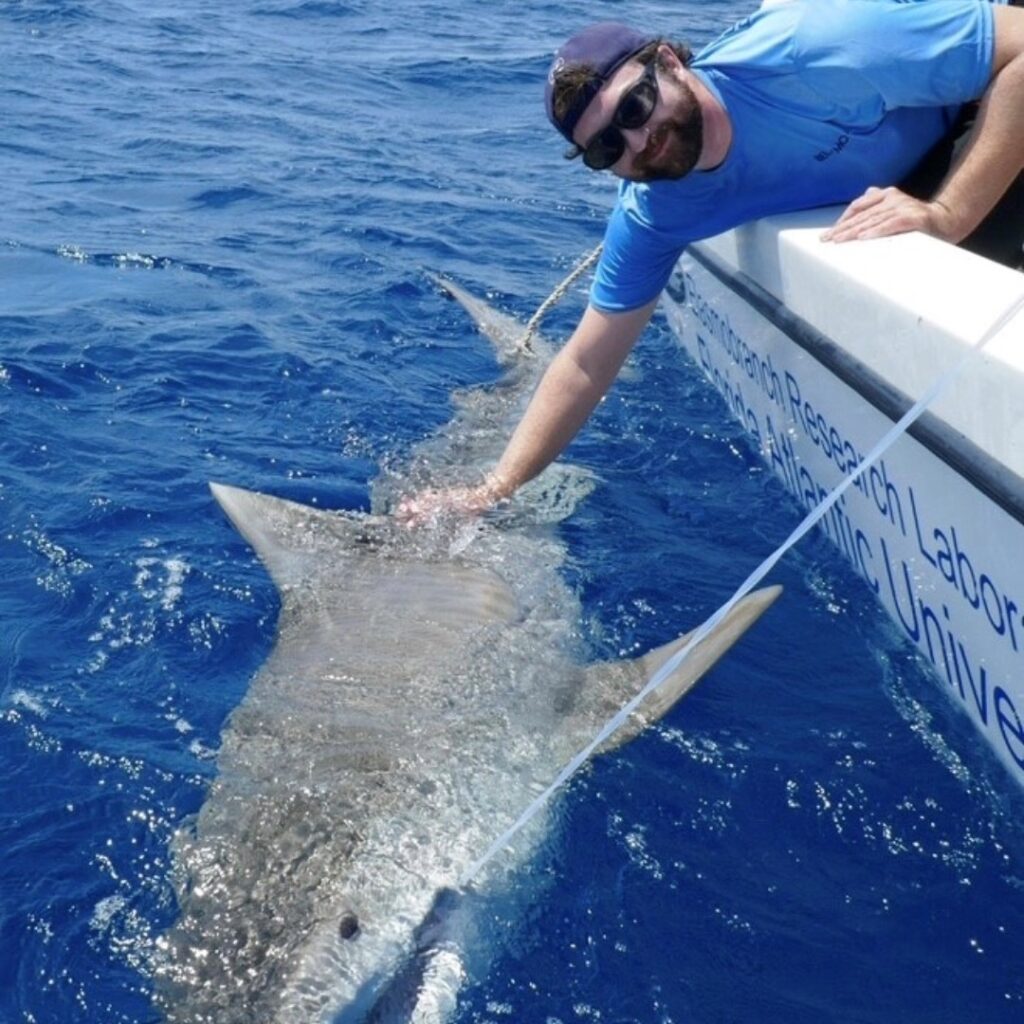 Zeke Tuszynski is a graduate student from Wenatchee, Washington, pursuing a master’s degree in biological sciences at Florida Atlantic University. His research focuses on studying the migration patterns of Blacktip sharks along the east coast of the U.S. Taking advantage of the large gatherings of Blacktip sharks in Southeast Florida during winter, the research aims to investigate the extent of their northward migration along the U.S. eastern seaboard using satellite transmitters and the environmental factors influencing their movement.
Zeke Tuszynski is a graduate student from Wenatchee, Washington, pursuing a master’s degree in biological sciences at Florida Atlantic University. His research focuses on studying the migration patterns of Blacktip sharks along the east coast of the U.S. Taking advantage of the large gatherings of Blacktip sharks in Southeast Florida during winter, the research aims to investigate the extent of their northward migration along the U.S. eastern seaboard using satellite transmitters and the environmental factors influencing their movement.
Given the Near Threatened Species status of Blacktip sharks, understanding their habitat use and migratory patterns becomes crucial for management and conservation efforts.
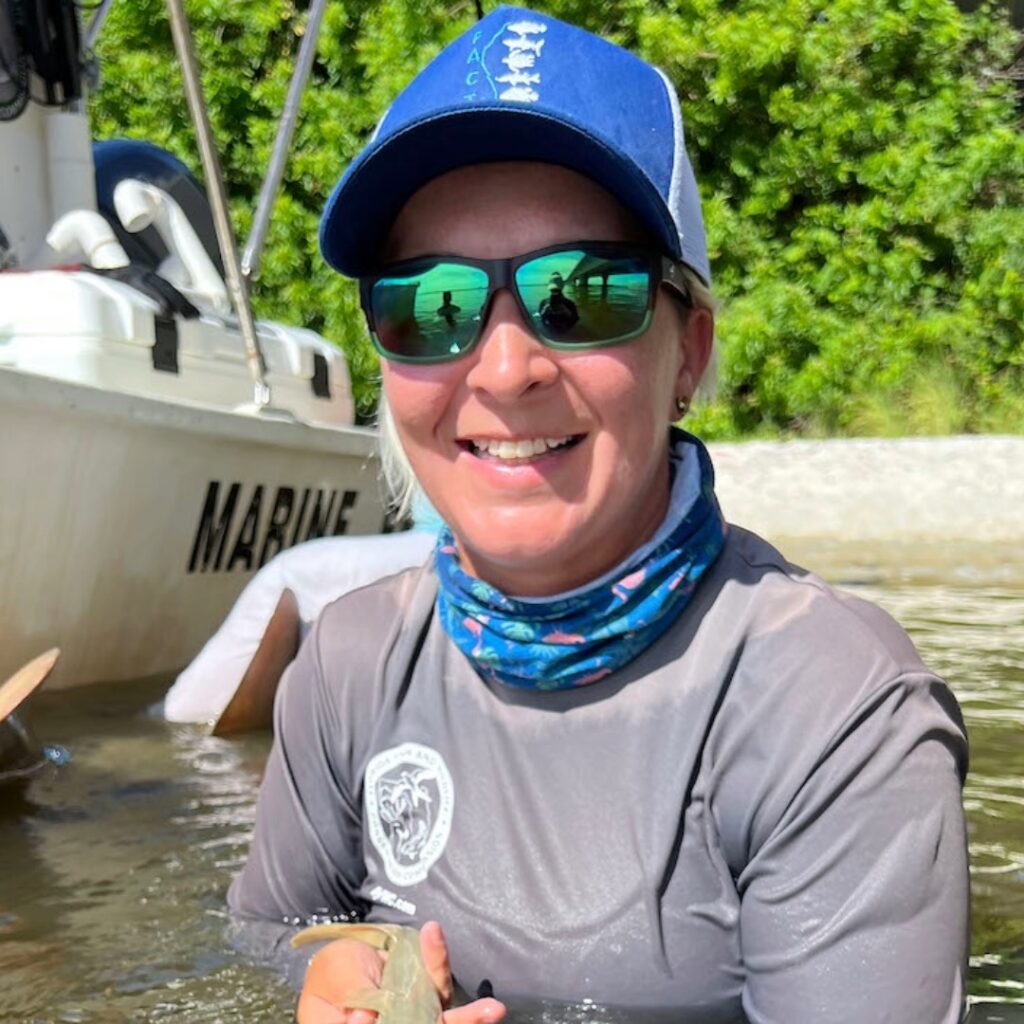 Sarah F. Webb is a Ph.D. candidate from Milltown, New Jersey, studying integrative biology at Florida Atlantic University. Her research focuses on evaluating estuary conditions, such as salinity, and its impacts on fish movements and behaviors. She examines the potential resurgence of nursery habitat in the St. Lucie Estuary for the endangered smalltooth sawfish, a species historically found in the area. Webb’s dissertation utilizes extensive fish and water quality monitoring to provide essential insights into the effects of these stressors, such as excessive freshwater inflow, on various fish species, including various estuarine-dependent sportfish, juvenile goliath grouper and juvenile smalltooth sawfish.
Sarah F. Webb is a Ph.D. candidate from Milltown, New Jersey, studying integrative biology at Florida Atlantic University. Her research focuses on evaluating estuary conditions, such as salinity, and its impacts on fish movements and behaviors. She examines the potential resurgence of nursery habitat in the St. Lucie Estuary for the endangered smalltooth sawfish, a species historically found in the area. Webb’s dissertation utilizes extensive fish and water quality monitoring to provide essential insights into the effects of these stressors, such as excessive freshwater inflow, on various fish species, including various estuarine-dependent sportfish, juvenile goliath grouper and juvenile smalltooth sawfish.
Webb’s work is crucial for resource managers seeking to better understand the dynamics of this unique ecosystem, which is part of the northern Everglades component of the RECOVER program. Understanding how these animals respond spatially to these inputs is vital for species conservation and predicting the impacts of water management decisions on marine populations.
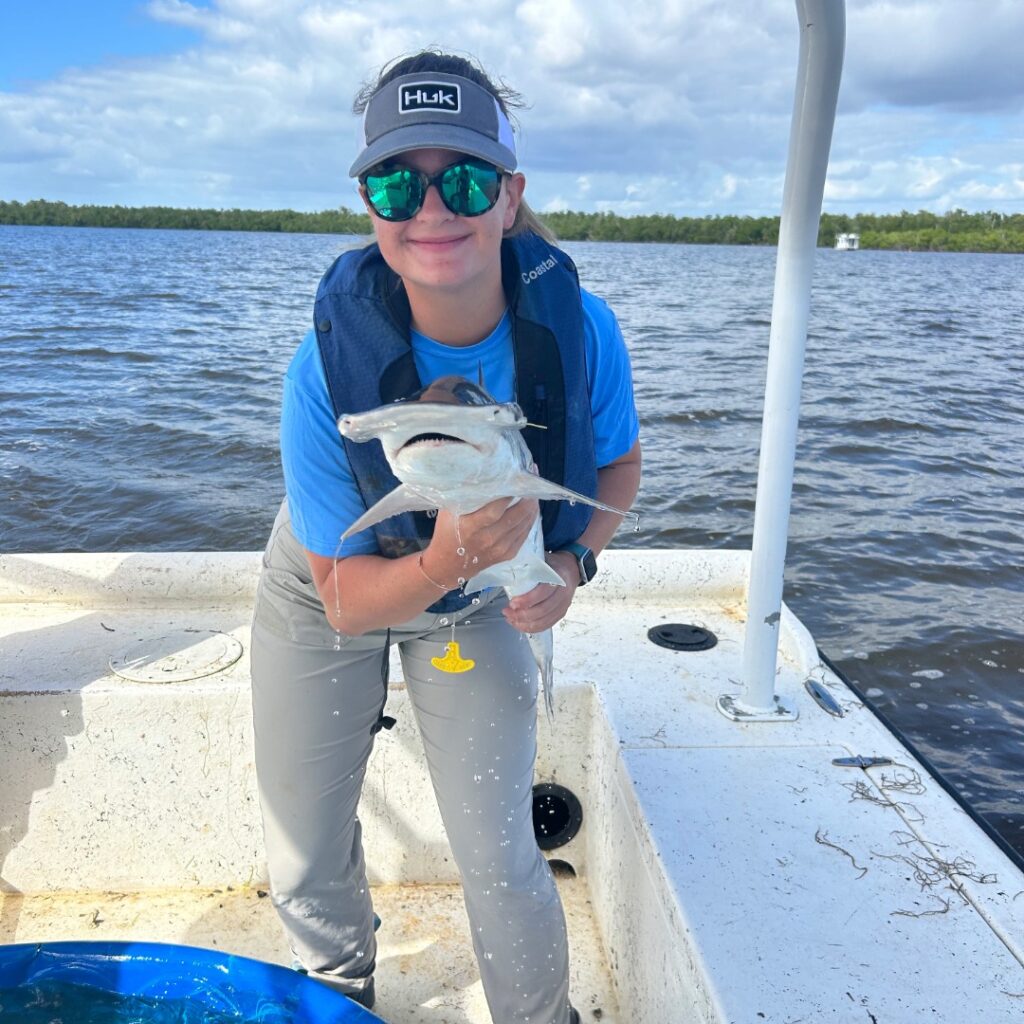 Susannah Cogburn is a master’s student from Winter Garden, Florida, studying environmental science at Florida Gulf Coast University. Her research focuses on the bioaccumulation of contaminants, such as heavy metals, polycyclic aromatic hydrocarbons (PAHs), Per- and polyfluoroalkyl substances (PFAS) and organochlorine pesticides (OCPs) in bull sharks, Carcharhinus leucas. Sharks are apex predators, so contaminant levels are likely high in their tissues, especially in species, such as C. leucas, which spend a portion of their life in estuaries with high contaminant loads.
Susannah Cogburn is a master’s student from Winter Garden, Florida, studying environmental science at Florida Gulf Coast University. Her research focuses on the bioaccumulation of contaminants, such as heavy metals, polycyclic aromatic hydrocarbons (PAHs), Per- and polyfluoroalkyl substances (PFAS) and organochlorine pesticides (OCPs) in bull sharks, Carcharhinus leucas. Sharks are apex predators, so contaminant levels are likely high in their tissues, especially in species, such as C. leucas, which spend a portion of their life in estuaries with high contaminant loads.
The results of this research will have direct fisheries impacts by helping to quantify pollutants and their persistence within our local fisheries stock. The bull sharks will also act as a proxy for other marine fishes to identify if the pollutants are present and the direct effect on their osmoregulation – the process of maintaining salt and water balance within the body.
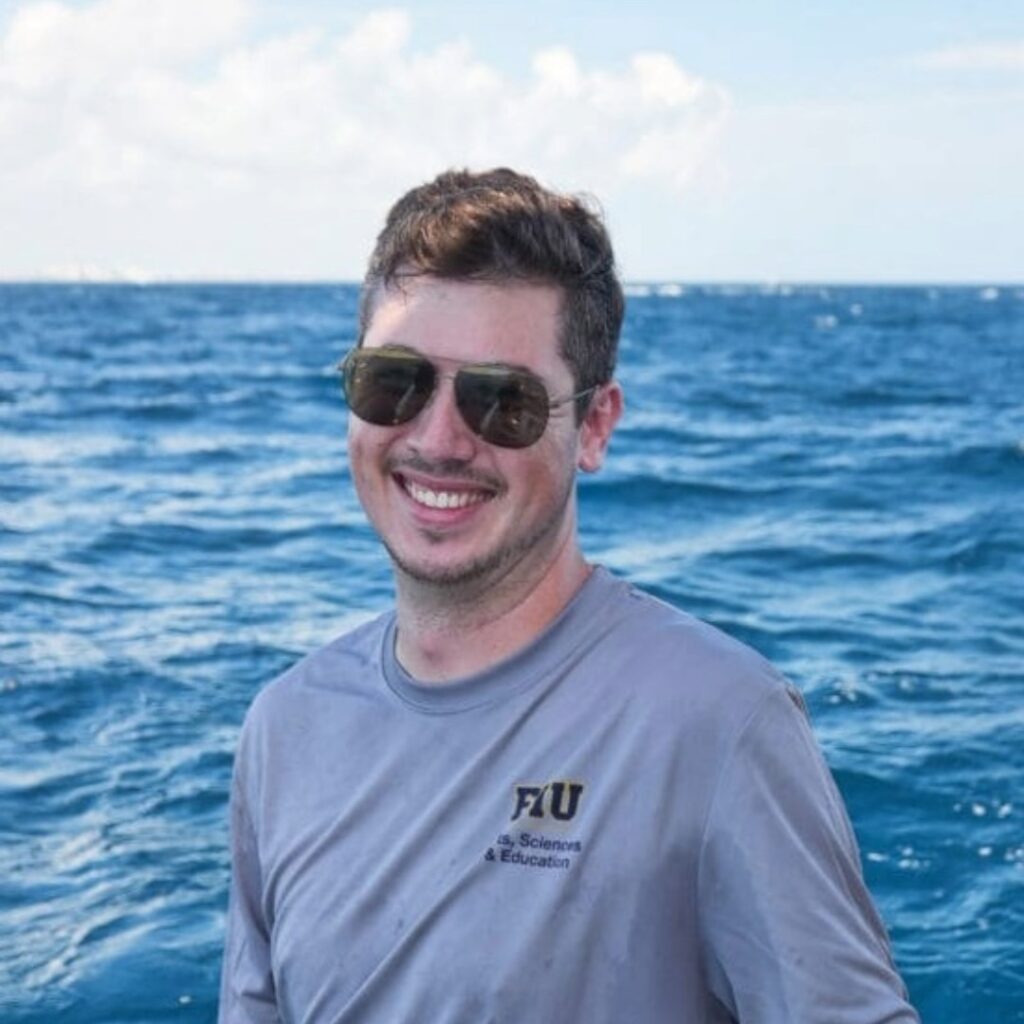 William Sample is a Ph.D. candidate from Jacksonville, Florida, studying biology at Florida International University. His research focuses on how environmental factors influence juvenile bull shark habitat use and foraging ecology in the coastal Everglades. Sample’s study aims to focus on the energy landscapes sharks encounter, how they change over time and space and how sharks adapt to them.
William Sample is a Ph.D. candidate from Jacksonville, Florida, studying biology at Florida International University. His research focuses on how environmental factors influence juvenile bull shark habitat use and foraging ecology in the coastal Everglades. Sample’s study aims to focus on the energy landscapes sharks encounter, how they change over time and space and how sharks adapt to them.
Given the challenges sharks are likely to face from climate change and sea level rise, Sample’s work will be important for the conservation of juvenile sharks and their habitats and in informing restoration and management efforts. By using historical data from more than 150 tagged bull sharks and new methods such as high-resolution accelerometry, he aims to provide insights applicable beyond his study area.
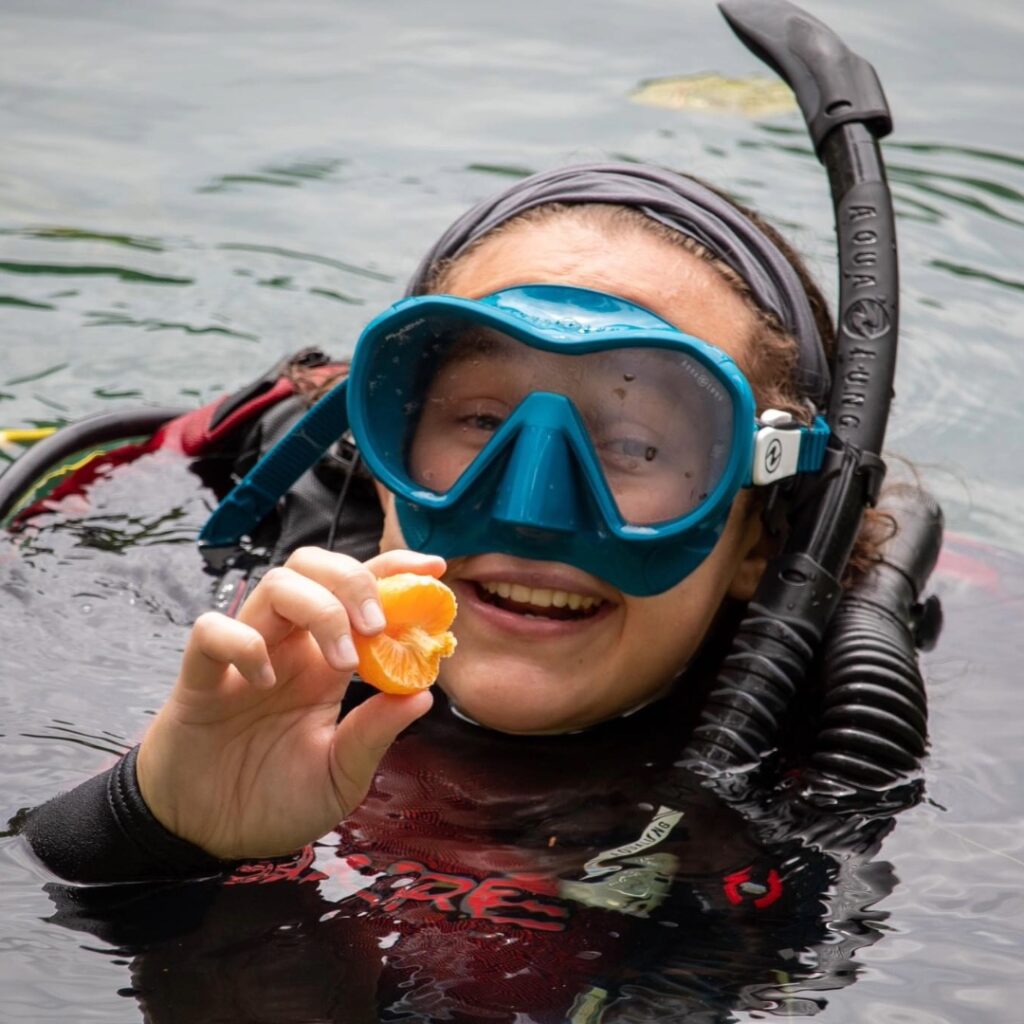 Annais Muschett-Bonilla is a Ph.D. student from Houston, Texas, studying biological sciences, with a focus on ecology and evolution at Florida State University. Her research focuses on the maternal reproduction of elasmobranch fish, which includes sharks, rays, skates and sawfish. These fish have various ways of nourishing their embryos, and each method has different physiological and energetic demands of the mother. Annais’s research seeks to quantify the effects of reproductive energetic demands on the performance of pregnant elasmobranchs, particularly in mature female Hypanus sabinus – a type of stingray – and possible influences on maternal survival.
Annais Muschett-Bonilla is a Ph.D. student from Houston, Texas, studying biological sciences, with a focus on ecology and evolution at Florida State University. Her research focuses on the maternal reproduction of elasmobranch fish, which includes sharks, rays, skates and sawfish. These fish have various ways of nourishing their embryos, and each method has different physiological and energetic demands of the mother. Annais’s research seeks to quantify the effects of reproductive energetic demands on the performance of pregnant elasmobranchs, particularly in mature female Hypanus sabinus – a type of stingray – and possible influences on maternal survival.
Given their slow repopulation rates and diverse embryo nourishment strategies, understanding and prioritizing species with similar reproductive strategies are crucial for efficiently managing and conserving elasmobranch species and safeguarding their diversity.
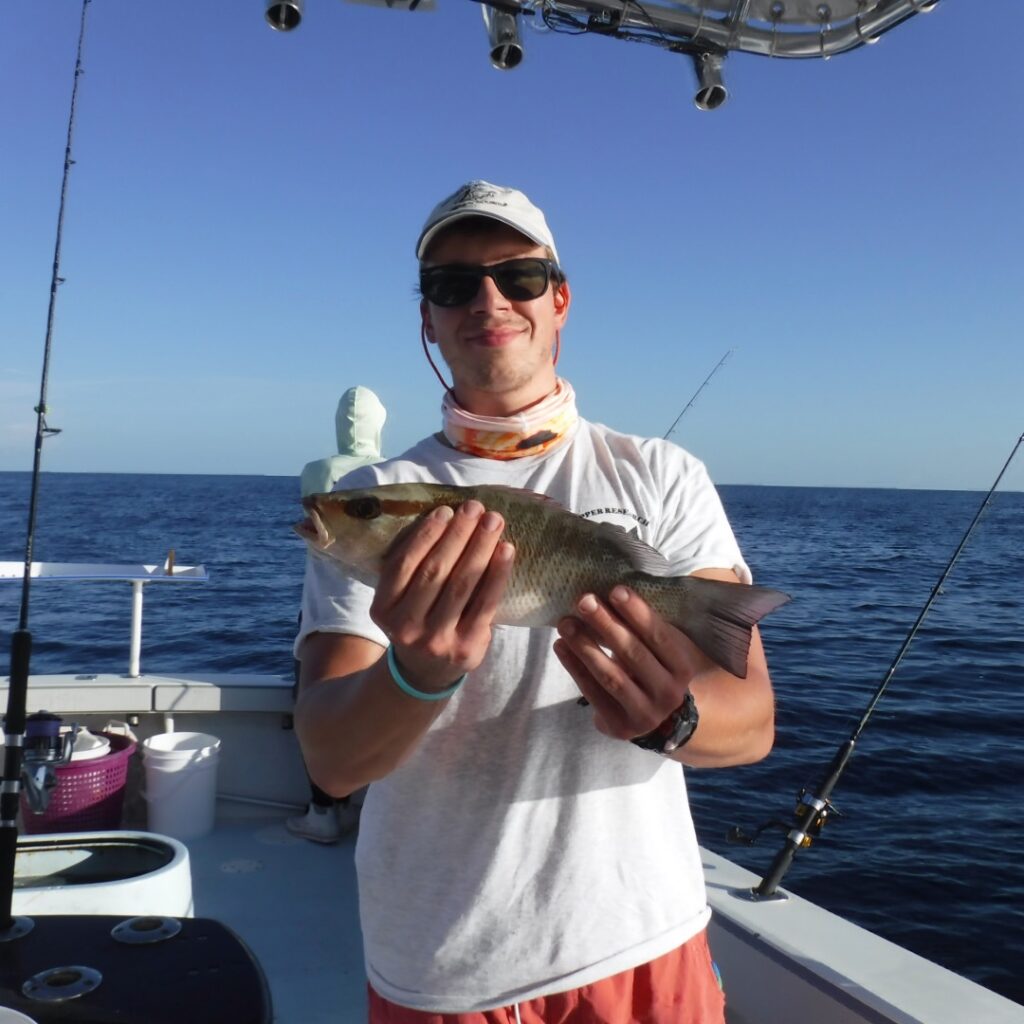 Eric Bovee is a graduate student from Queens, New York, pursuing a master’s degree in fisheries and aquatic sciences at the University of Florida. His research focuses on tagging and tracking the Gray Snapper (Mangrove Snapper), a species found in spawning aggregations located 80 to 100 miles offshore in the Florida Middle Grounds. Engaging in extensive fieldwork, he tags the fish during their offshore presence and subsequently collaborates with fishers to recover valuable information about the fish, including their recovery locations. Bovee’s research is all about using dispersal modeling to predict where Gray Snapper eggs and larvae go after they’re spawned in the ocean.
Eric Bovee is a graduate student from Queens, New York, pursuing a master’s degree in fisheries and aquatic sciences at the University of Florida. His research focuses on tagging and tracking the Gray Snapper (Mangrove Snapper), a species found in spawning aggregations located 80 to 100 miles offshore in the Florida Middle Grounds. Engaging in extensive fieldwork, he tags the fish during their offshore presence and subsequently collaborates with fishers to recover valuable information about the fish, including their recovery locations. Bovee’s research is all about using dispersal modeling to predict where Gray Snapper eggs and larvae go after they’re spawned in the ocean.
This is important because too much fishing in these spawning areas can be harmful. By figuring out where the larvae end up, Bovee can help scientists understand the connectivity between the offshore spawning areas and the coastal areas where they live and grow up.
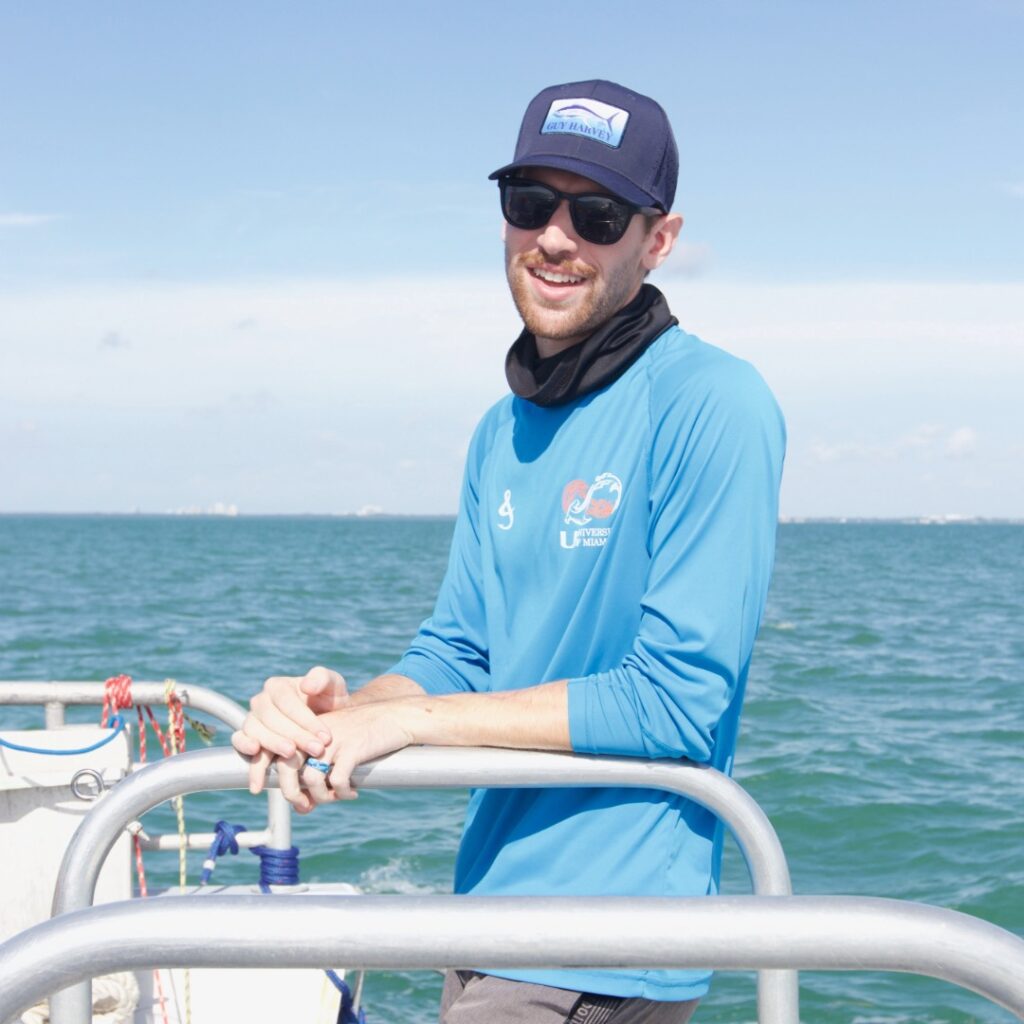 John Francis Hlavin is a Ph.D. student from Vienna, Virginia, studying environmental science and policy at the University of Miami. His research focuses on the importance of various ecological dynamics to the management of nursery areas for coastal predatory fish. He is particularly interested in using minimally invasive techniques to study the ecology of juvenile great hammerhead sharks within Biscayne Bay – an identified great hammerhead nursery – to better understand how patterns of resource and habitat-use can inform the conservation of this critically endangered species at a highly vulnerable life-stage.
John Francis Hlavin is a Ph.D. student from Vienna, Virginia, studying environmental science and policy at the University of Miami. His research focuses on the importance of various ecological dynamics to the management of nursery areas for coastal predatory fish. He is particularly interested in using minimally invasive techniques to study the ecology of juvenile great hammerhead sharks within Biscayne Bay – an identified great hammerhead nursery – to better understand how patterns of resource and habitat-use can inform the conservation of this critically endangered species at a highly vulnerable life-stage.
Additionally, Hlavin has projects looking at the trophic ecology of the understudied Atlantic guitarfish and the potential impact of invasive lionfish on nursery habitat use in Great Barracuda. By studying these high-priority species and their interactions, his work helps scientists to better manage local ecosystems for the conservation of South Florida’s predatory fish.
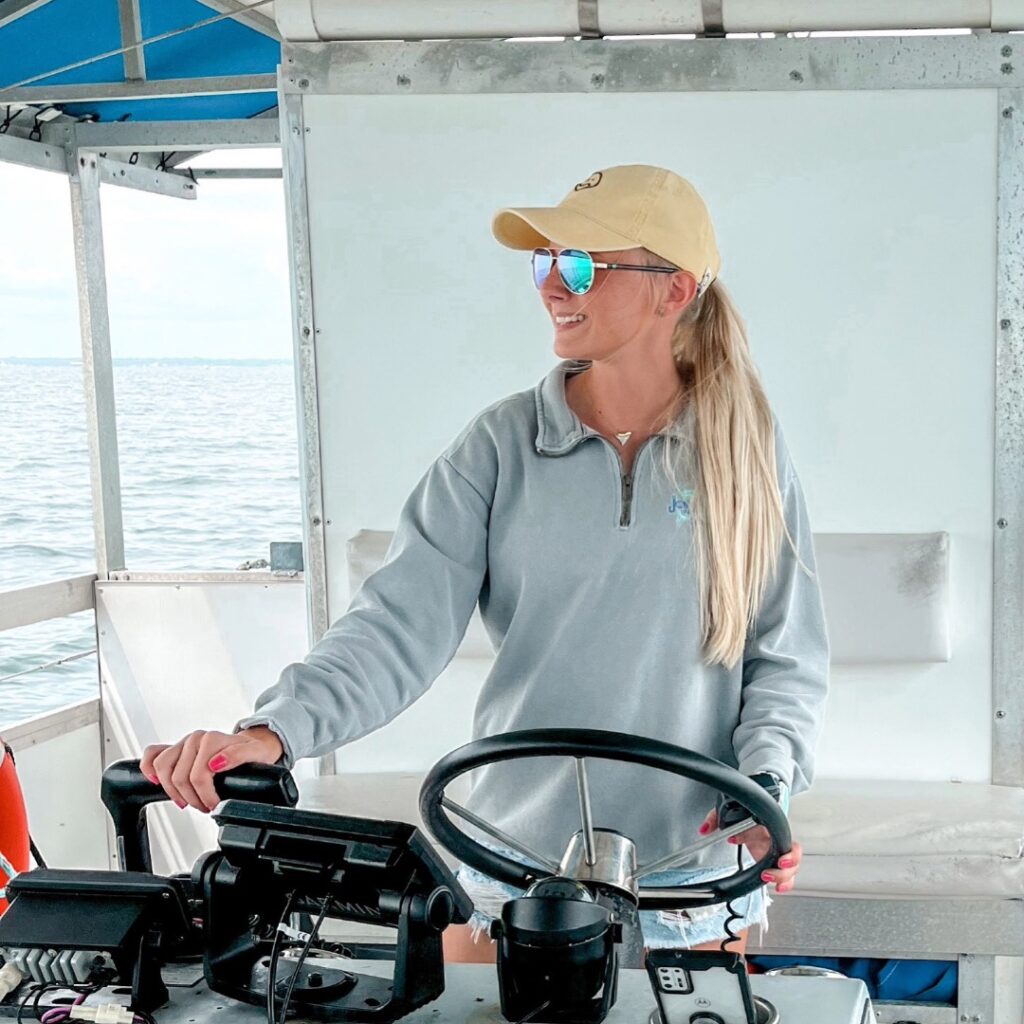 Alexis Mitchem is a Ph.D. student from Pensacola, Florida, studying marine science at the University of South Florida. Her research focuses on DNA barcoding to identify fish eggs and efforts to make molecular research tools more accessible and affordable. Accurate identification of the early life stages of fish is critical for conservation biology. However, eggs are challenging to identify due to a lack of distinguishing morphological features. Her research project involves using DNA barcoding – a tool used for species identification based on specific genes – to identify fish eggs down to the species level.
Alexis Mitchem is a Ph.D. student from Pensacola, Florida, studying marine science at the University of South Florida. Her research focuses on DNA barcoding to identify fish eggs and efforts to make molecular research tools more accessible and affordable. Accurate identification of the early life stages of fish is critical for conservation biology. However, eggs are challenging to identify due to a lack of distinguishing morphological features. Her research project involves using DNA barcoding – a tool used for species identification based on specific genes – to identify fish eggs down to the species level.
Building on 10 years of fish spawning data during the summer season on the West Florida Shelf, Mitchem plans to expand sample collection to cover all seasons over several years to determine when other important fish species are spawning and will team up with a physical oceanographer to model egg movement by surface currents.
About Guy Harvey:
Guy Harvey is a unique blend of artist, scientist, diver, angler, conservationist, and explorer, fiercely devoted to his family and his love of the sea. His childhood passion for the ocean and its living creatures not only inspired him to draw but fueled a burning interest that prompted a formal education in marine science. Having graduated with honors in Marine Biology from Aberdeen University in Scotland in 1977, Guy returned home to Jamaica to resume his education, earning his Ph.D. from the University of the West Indies in 1984. Though he gave up a budding career as a marine biologist for that of a highly acclaimed artist, Guy has continued his relentless pursuit to unravel the mysteries of the sea, traveling the world to better understand the habits and habitats of the marine wildlife he paints. For more information, please visit www.GuyHarvey.com. Follow Guy on Facebook, on Twitter, connect on Instagram, and tune in to see Guy’s latest expeditions on YouTube.
About the Guy Harvey Foundation:
With a focused mission to better understand and conserve the ocean environment, the Guy Harvey Foundation (GHF) collaborates with local, national and international organizations to conduct scientific research and provides funding to affiliated researchers who share this objective. The GHF also develops and hosts cutting-edge educational programs that help educators to foster the next era of marine conservationists, ensuring that future generations can enjoy and benefit from a properly balanced ocean ecosystem www.GuyHarveyFoundation.org.
About Florida Sea Grant:
Hosted at the University of Florida (UF), the Florida Sea Grant College Program supports research, education and Extension to enhance coastal resources and economic opportunities through a partnership with the National Oceanic and Atmospheric Administration, the State University System of Florida, and UF/IFAS Extension in counties statewide. flseagrant.org | @FloridaSeaGrant.